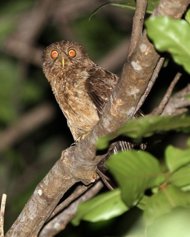New owl species discovered in Philippines

Eight of the new species were previously considered sub-species while two are totally new, said Lisa Paguntalan, field director of Philippines Biodiversity Conservation Programme.
"There is no significant variation in their forms. It was the sound difference of their calls that was very significant in distinguishing between species," she told AFP.
Paguntalan warned that many of these new species were possibly endangered because they were found only in small isolated islands or in tiny pockets of forests.
Ornithologists and birdwatchers from Michigan State University, Birdlife International and other groups used museum samples and high-quality photography and recording systems to show the owls were of different species.
The research took 10 years but the results were only announced after coordination between the various groups.
The two new species are the Cebu hawk owl and the Camiguin hawk owl, found in the central Philippine islands of Cebu and Camiguin respectively.
They are described as about eight to 12 inches (20 to 30.5 centimetres) in size and hard to spot.
The Philippines is an archipelago of more than 7,000 islands with diverse animal species evolving in different parts of the country but many of these unique species are threatened by destruction of their habitat.
What the stars mean:
★ Poor ★ ★ Promising ★★★ Good ★★★★ Very good ★★★★★ Exceptional
 Tag:
Tag:
Related Contents
Latest News
More News
- Russian President congratulates Vietnamese Party leader during phone talks (January 25, 2026 | 09:58)
- Worldwide congratulations underscore confidence in Vietnam’s 14th Party Congress (January 23, 2026 | 09:02)
- Political parties, organisations, int’l friends send congratulations to 14th National Party Congress (January 22, 2026 | 09:33)
- 14th National Party Congress: Japanese media highlight Vietnam’s growth targets (January 21, 2026 | 09:46)
- 14th National Party Congress: Driving force for Vietnam to continue renewal, innovation, breakthroughs (January 21, 2026 | 09:42)
- Vietnam remains spiritual support for progressive forces: Colombian party leader (January 21, 2026 | 08:00)
- Int'l media provides large coverage of 14th National Party Congress's first working day (January 20, 2026 | 09:09)
- Vietnamese firms win top honours at ASEAN Digital Awards (January 16, 2026 | 16:45)
- ASEAN Digital Ministers' Meeting opens in Hanoi (January 15, 2026 | 15:33)
- ASEAN economies move up the global chip value chain (December 09, 2025 | 13:32)


















 Mobile Version
Mobile Version